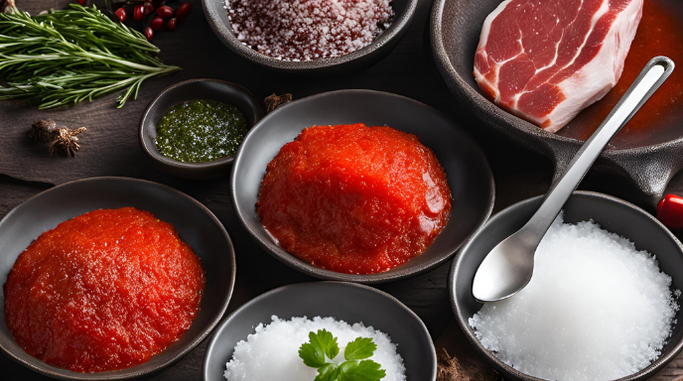Marinades are a great way to infuse flavor, tenderize meats, and add moisture to your dishes. While many marinade recipes call for an array of herbs, spices, and acids, one ingredient stands out as a must-have: salt. Though often considered just a seasoning, salt plays a crucial role in how marinades work. From enhancing flavor to improving texture, using salt in marinades can take your cooking to the next level. Here's a closer look at the benefits of incorporating salt into your marinade recipes.
1. Enhances Flavor and Depth
Salt is a flavor enhancer—this is perhaps the most well-known benefit. When used in marinades, salt helps bring out the natural flavors of the meat, vegetables, or tofu being marinated. It works by dissolving in the marinade and drawing out moisture from the meat’s surface. This moisture then mixes with the marinade ingredients, allowing the flavors to penetrate deeper into the meat.
In addition, salt can help balance the other flavors in the marinade, such as acidity from vinegar or citrus, sweetness from sugar or honey, and the earthiness of herbs and spices. A well-seasoned marinade, with the right amount of salt, results in a more flavorful and balanced dish.
Example: When marinating chicken, a little salt helps bring out the savory notes of the meat, while enhancing the flavors of garlic, lemon, and herbs in the marinade.
2. Tenderizes Meat
One of the most important functions of salt in a marinade is its ability to tenderize meat. Salt works by breaking down the proteins in meat, specifically muscle fibers and collagen, which helps soften the meat’s texture. This process, called "protein denaturation," allows the marinade to be absorbed more easily, resulting in a more tender bite.
Salt can also help retain moisture during the marinating process. As it draws out moisture from the surface of the meat, the liquid is then reabsorbed along with the other marinade ingredients. This helps the meat stay juicy, even when cooked at high temperatures.
Example: For tougher cuts of beef, such as flank steak or skirt steak, a marinade with salt will help break down the tough fibers, making the meat more tender and flavorful.
3. Improves Moisture Retention
Salt's ability to draw moisture and then reintroduce it into the meat helps retain its natural juices during cooking. When salt is added to a marinade, it initially pulls moisture from the meat, but this moisture is then reabsorbed along with the marinade’s flavors. This process is particularly helpful for lean cuts of meat, like chicken breasts, pork chops, or fish, which tend to dry out during cooking.
The result is a juicier, more flavorful piece of meat, as the salt allows the proteins to retain moisture, preventing them from becoming tough or dry during grilling, roasting, or pan-frying.
Example: Marinating a piece of fish, such as salmon, with salt helps prevent it from drying out while cooking, leaving it moist and tender.
4. Promotes Better Absorption of Other Marinade Ingredients
Salt not only helps tenderize meat but also improves the overall absorption of other flavors in the marinade. The moisture that is drawn out and then reabsorbed along with the marinade allows spices, herbs, and other flavoring agents to penetrate deeper into the meat. This means the flavor isn’t just on the surface of the meat but is absorbed more evenly throughout.
For example, if you marinate beef with garlic, soy sauce, and ginger, the salt helps the meat absorb the garlic’s pungency, the soy sauce’s umami, and the ginger’s heat, resulting in a well-seasoned piece of meat from the inside out.
5. Helps with Preservation
Salt has natural preservative qualities, which can extend the life of your marinated meat, especially if you're planning to store it for a period before cooking. The salt inhibits the growth of bacteria, allowing the marinated meat to be safely stored in the fridge for longer without spoiling. While this isn’t the primary function of salt in a marinade, it’s an added benefit if you're prepping meals in advance.
Example: If you're marinating meat the day before cooking, the salt will help keep the meat safe from bacterial growth, ensuring that it stays fresh overnight in the fridge.
6. Creates a Flavor "Crust" When Grilled or Roasted
When marinated meat is cooked, the salt helps form a flavorful crust or outer layer. This is especially noticeable when grilling or roasting meats. As the salt interacts with the heat, it draws moisture out of the surface, concentrating the flavors and creating a savory crust. This crust not only enhances flavor but also adds texture, making the meat more appetizing.
For example, salt helps form a crispy, caramelized exterior on steaks and chicken when grilled or roasted, providing a contrast to the tender, juicy interior.
7. Balances Acidity and Sweetness
Many marinades include acidic ingredients, such as vinegar, citrus juice, or wine, which help tenderize meat and add brightness. However, too much acidity can make the dish overly tangy or harsh. Salt helps balance the sharpness of acidic ingredients by mellowing out their intensity and enhancing their natural flavors.
Similarly, salt can balance out the sweetness of a marinade, such as honey or brown sugar, by reducing its cloying effect. A well-balanced marinade relies on salt to harmonize the different flavor components.
Example: A marinade with soy sauce, orange juice, and brown sugar benefits from the addition of salt, which balances the acidity of the citrus and the sweetness of the sugar.
8. Aids in Creating a Smooth, Velvety Sauce
In some cases, salt is added directly to the finished marinade or sauce to help create a smoother texture. When salt dissolves in a liquid, it can help break down oils and fats, allowing them to mix more evenly with the other ingredients. This results in a smoother, more velvety marinade or sauce that coats meat more evenly.
Example: When making a marinade with oil, vinegar, and mustard, a pinch of salt can help emulsify the oil and vinegar, resulting in a smoother texture that better adheres to the meat.
Conclusion
Salt is far more than just a seasoning in marinades—it’s an essential ingredient that enhances flavor, tenderizes meat, helps retain moisture, and allows other flavors to penetrate more deeply. Whether you're marinating chicken, beef, pork, fish, or vegetables, using salt in your marinade is a simple yet effective way to elevate your cooking. By understanding the science behind salt’s role in marinades, you can create more flavorful, tender, and juicy dishes every time. So next time you prepare a marinade, don’t overlook the power of salt—it’s the secret ingredient that can make all the difference.




